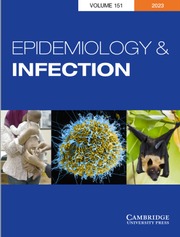Article contents
An indoor system for the study of biological aerosols in open air conditions
Published online by Cambridge University Press: 15 May 2009
Summary
An indoor system designed for the study of survival of airborne micro-organisms in closed conditions has been successfully modified to allow the effect of open air to be measured. It was found that the unidentified open-air factors which are toxic for many species of microbes and rapidly lost when enclosed in conventional laboratory apparatus could be retained in the system by continuous ventilation at an adequate rate. The rate required allowed examination of Escherichia coli in aerosols generated from small amounts of material because of the short periods of ventilation required for appreciable viable decay to occur.
The validity of the system was tested by comparing the survival of E. coli in true aerosols with its survival when the droplets were held on microthread. An investigation of the role of relative humidity in open-air toxicity was included.
- Type
- Research Article
- Information
- Copyright
- Copyright © Cambridge University Press 1971
References
REFERENCES
- 9
- Cited by


